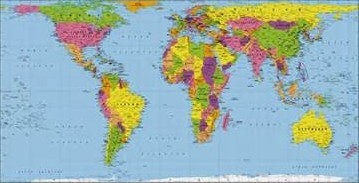Should We Separate Politics and Religion?
QUOFLECTIONS™
ON SPIRITUALITY AND ETHICS
“You have heard that it was said,
‘an eye for an eye and
a tooth for a tooth,’
but I say to you…”
Jesus (Matt. 5:38-39)
Many readers have responded to this column in recent years. Abraham Glazer’s letter last week on politics and spirituality was thought-provoking. Undoubtedly, many readers share his views.
Among other ideas, Mr. Glazer courteously states that, while this column accurately presents the words of Jesus, it also expresses a narrow viewpoint. Mr. Glazer believes I too frequently portray Americans negatively and should “educate in a more accurate way the core religious qualities that have made us a great nation.”
Instead of political positions, he suggests a minister or rabbi should focus more on spiritual phenomena. He cites the importance of offering hope and portraying a more complex picture of faith’s challenges.
I agree with the need for a broad perspective. Surely, Christians and Jews alike must struggle to understand the context of scripture, including its many implications for our lives as individuals and as part of a community.
I would also agree that church and state must be separate: The institutional church cannot rule the state–this is theocracy; and the state cannot rule the church–this violates religious liberty.
Still, many believe that politics and religion must also be separate. Religion, they say, is purely a spiritual matter, and ministers should focus on providing pastoral care. Politics is the secular business of our local, state and national life.
This paradigm does not account, however, for the pervasiveness of politics in the Bible. Moses, for example, challenges Pharaoh, Egypt’s highest political officer. The Hebrew text repeatedly invokes worship of the God who liberates from the political oppression of slavery.
The prophets challenge the political positions of kings as well as the religious practices of priests. Amos decries the connivance of political and business leaders. Isaiah, Jeremiah and Ezekiel oppose their nations’ foreign policies, warning that militarism leads to destruction. Despite accusations they were unpatriotic, history vindicates their warnings that political practices must be just.
Moreover, at his birth and death, politicians plot to kill Jesus. Shortly after birth, Jesus becomes a refugee, a political status with moral implications. Jesus’ overturning of the tables of banksters at the Temple is political–an act of civil disobedience. The crucifixion of the ‘King of the Jews’ is Rome’s ultimate act of political injustice.
If we snip all political references in the Bible, a pile of disjointed scraps remain. Surely, the political and the religious cannot be separated.
We all have political beliefs. Are these viewpoints sacrosanct-—or are even our political perspectives open to the insights of faith?
Does God abandon all concern for our political lives? Or should we sincerely pray for God’s guidance in matters affecting our city, state, nation and world? Should we then deny believers–including ministers–from seeking to persuade others of their religiously-held political beliefs?
Loving our neighbor takes many forms–political as well as personal.
One congregant, for example, candidly states he prefers “an eye for an eye” to Jesus’ instruction to love our enemies. Jesus negates this ancient saying that, at its inception, restricts the practice of unlimited vengeance. This otherwise upright parishioner, however, favors the politics of retribution. This belief affects policy with respect to virtually all aspects of the criminal justice system.
Jesus’ teaching is clear: Our love for enemies must encompass all aspects of life. Whether liberal or conservative, our politics must be compassionate.
Jesus challenges the political practices of Judah. As with God during the Exodus, Jesus empowers the politically oppressed, giving them hope. He also confronts the exploitation and greed of the wealthy and powerful–whose injustices are increased by the misuse of polital power. Indeed, opposing political cruelties is central to Jesus’ ministry.
I realize some are offended when our nation is criticized. In the spirit of reflection demonstrated by Mr. Glazer, I would ask that he and all of us reconsider our capacity for national self-critique. Does not our hope depend upon our willingness to confront our transgressions, both as individuals and as a nation?
Jesus teaches that each of us has a log in our eye, while our neighbor has only a speck. So we must examine ourselves, remove the log, and then assist our neighbor. We need humility. We should no more declare ourselves a great nation than an individual declare himself a great person.
The political realm is, by definition, indispensable to life in the “Kingdom of God.” We must be open to the Spirit as we make difficult choices. Can patriotic fervor cause our love to dissipate beyond our national borders? Yes, it can, but surely not if we are the global citizens and loving neighbors Jesus calls us to be.
©2006 Harry Rix. All rights reserved.
Related Articles
Enlarging Our Radius of Concern
Loving Our Neighbors as Ourselves
Entering the World of the Child
Luke’s Call for Compassion
Reconsidering Cronyism

